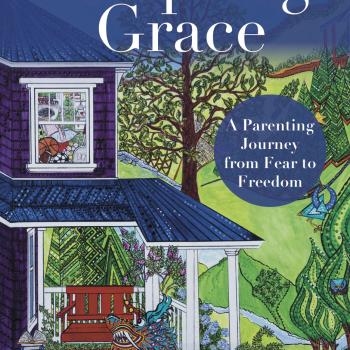E asks,
Hello, Cindy! I was hoping to receive some advice regarding creating and maintaining positive relationships between my children and their fundamentalist grandparents and other family members. I was raised in a fundamentalist family, where I was homeschooled and forbidden to have “secular” relationships with people, including cousins and neighbors. I’m now 34, married with two children, I have a degree in early child development and my husband is a high school teacher. We attend a Christian church that is open and free to all life styles and political parties. We are feminists, we are democrats, and we don’t own guns – which means that I now vary from nearly every viewpoint I was raised with.
Last summer, when my daughter was not yet 3, an incident occurred at my mothers house while I was visiting. I was unaware, but later my daughter told me “I hit grandma because she grabbed my arm. Her hitted me back.” At the end of our visit, my daughter struggled with getting in the car (she has difficulty with transitions, as many preschoolers do). My mom told me “you should bring a spoon with you when you visit. I’m not being rude, because it says in the Bible that you hate your kids if you don’t spank them. She isn’t very respectful of me and she isn’t very respectful of you either.”
It’s been nearly a year now, and these comments have stopped, because I don’t let her out of my sight when we are visiting and I don’t leave her alone there, ever.
I’m not foolish enough to believe I will change any of their viewpoints, so confronting them is not something I can see as being profitable. I just don’t want family events to be a chore for the rest of my life.
Is it possible for adults who have chosen different viewpoints to maintain healthy relationships with fundamentalists?

Image: Unsplash
Dear E,
What a remarkable journey you have been on from a sheltered, home-schooled girl to who you and your family are today. I have traveled a similar faith trajectory, so I know from personal experience how tumultuous it can be.
A faith shift isn’t a mere change of beliefs, but a shedding and putting on of a new identity, community, and values.
I don’t know how your fundamentalist family of origin has responded to your own faith shift, but I know oftentimes these changes can happen within ourselves, quite invisible to the outside world. Many people remain ‘closeted’ with their newfound views, if only to avoid unnecessary conflict at Thanksgiving and Christmas.
However, what I am reading from your letter is that having children of your own is bringing those conflicts up to the surface, and tension is no longer avoidable.
Although it is hard, I actually think this is a good development of your faith evolution. As lovely as it is to remain amiable with family, authenticity is even better. Children bless us in many ways—in particular, our immense love for them compels us to grapple uncompromisingly with our most cherished values.
It is apparent that your values in raising your children is markedly different from your mother. You believe in granting your child autonomy, physical and otherwise. Your mother violated that, both with her actions and with her words. There is no doubt her view is unacceptable, and you have decided resolutely to protect your daughter from her toxic ways of rearing children.
This is what I have learned from my friend Kay Bruner, a therapist, about faith shifting and fundamentalist family. Fundamentalism, by nature, requires its in-group members to behave according to doctrine. When a family member strays beyond the boundaries of the doctrine, it produces a lot of anxiety which manifests in a compulsion to modify the behavior of the “wayward” family member. I see this in your mother’s request for you to bring a spoon with you and to parent your child with harsh authoritarian methods.
At this point, the unfundamentalist typically conforms behaviorally and carry the anxiety of their family in order to keep the peace until they simply cannot do it anymore.
I sense this may be where you are at. You have tried to continue bringing your daughter to family events while drawing boundaries around those interaction for your daughter’s protection. You have drawn solid boundaries physically by making sure your daughter is never left alone with them.
But you are becoming increasingly frustrated, enough that it has compelled you to write this letter to me. Perhaps it is because you have not drawn as solid of boundaries emotionally. You are, what Kay would say, doing the emotional work for your family, carrying their anxieties of your divergent beliefs, and you are wondering if there’s any hope of sustaining a long-term relationship when you are so weighed down by those anxieties.
Here’s what I know about us parents: we are often much more willing to do things to protect our children than we are to protect ourselves. At the risk of some conflict, you have taken steps to protect your child, but you need to also protect your own soul. Decide what your emotional boundaries are and communicate them with your family. Maybe it looks like having a conversation about the way you and your partner have decided to parent your daughter and ask them to respect that. Or, it’s simply saying you will only be showing up to certain family events but not all. There’s no need to be aggressive, defensive, or to over-explain. Fundamentalists will typically recoil from boundaries as if you are committing a high crime, and that is because fundamentalism does not equip individuals to maintain any boundaries at all.
The hope is, by sticking to your boundaries, over some time, they will begin to respect it. You get to be authentically yourself (and model healthy boundaries for your children as an essential bonus) and will be able to invest in loving relationships with your fundamentalist family without the additional burden of anxiety.
Like you said, they probably won’t change their views. But by drawing healthy emotional boundaries, neither will you have to adjust yours to be less than authentic with them.
Thank you for being a brave cycle-breaker. For doing the grueling inner work of uprooting toxic views of your own upbringing and forging a better way for your own family. As the writer Annie Reneau says, “Raising kids with minimal damage is a gift to the world.” We are ready for the gift of your sensitive girl—thank you for stewarding her childhood with so much care.
Cindy for Unfundamentalist Parenting
See Kay Bruner’s Faith Shift Boundaries animation here.
Get a free download of a Christian parenting manifesto that helps us guide children into healthy spirituality + the most helpful parenting resources with progressive values.
*This is part of Ask Unfundamentalist Parenting series where I answer real life parenting dilemmas. You can submit questions to cindywords@icloud.com*

















